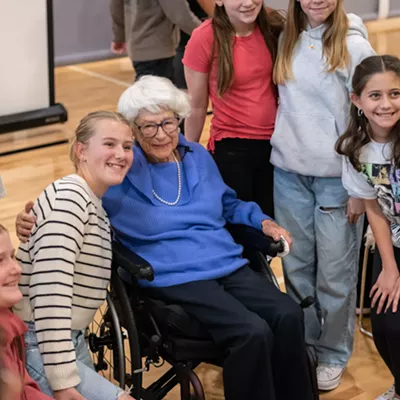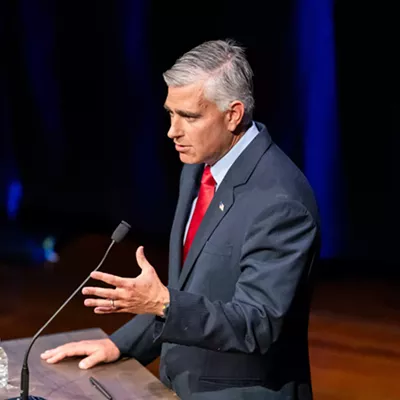In an effort to crack down on homeless encampments in the city, the Spokane Valley City Council unanimously approved a measure last night that would ban camping from public property. They also passed a measure that would restrict operating hours for city parks.
The camping ordinance would bar people from camping on all city land or living in vehicles on the right of way or parking lots owned by the city — unless there are no beds available at homeless shelters in Spokane. Violators could face up to 90 days in jail or a $1,000 fine. The ordinance would also permanently ban camping from three locations, including City Hall and Balfour Park, regardless of whether or not there were shelter beds available.
Spokane Valley Mayor Rod Higgins, who did not respond to a request for comment, previously told the Spokesman-Review that “there are some places homeless [people] shouldn’t be allowed, period."
The other measure amending city park operating hours would restrict use of parks to 6 am to 9 pm from April to October and 6 am to 7 pm during the winter months — changes that could also impact the local homeless population. Violators could be cited with a civil infraction and a $50 fine.
Some community members who testified at Tuesday night's council meeting criticized the camping ban as effectively criminalizing homelessness and sidestepping the fact that the city lacks its own shelter.
"I used to live in Spokane Valley three years ago when I became homeless. We moved here from Florida, had a good job, lost it, the economy fell out — the story everybody’s got," said one formerly homeless man who testified at the meeting. "I have yet to hear any solutions to the problem except for prosecution and removal of their property," he added.
"We all agree that people shouldn't be sleeping in parks or doorways. But where do we take them to?" said Julia Garcia, who helps run the nonprofit homeless services provider, Jewels Helping Hands. "Before you vote on this, understand that criminalizing homelessness is only going to provide another barrier for them."
Spokane Valley City Councilwoman Linda Thompson argued prior to the vote that the camping measure would help homeless people get connected to services.
"This is not stigmatizing people without homes, " she said at the meeting. "We need to get more resources on the ground. But right now we are in a crisis where it is cold and we have to move now."
Meanwhile, Councilman Arne Woodard claimed that the ordinance is necessary for public safety.
"Criminalization is not the answer. But we have to protect the homeless and the rest of the public," he said.
The camping ban measure is similar to restrictions imposed by Spokane County and the City of Spokane, which aim to both limit homeless encampments while also complying with the Ninth Circuit’s impactful ruling on Boise’s ordinance banning outdoor sleeping, which requires that shelter must be made available for public camping laws to be enforced. Boise has appealed the ruling to the U.S. Supreme Court, and both Spokane and Spokane Valley are supporting the effort.
But the provision in Spokane Valley's measure that permanently bans camping on certain public property — regardless of whether or not shelter is available — stand in contrast to similar laws in the region.Spokane Valley city staff argue that the rule doesn’t violate the Ninth Circuit ruling because it provides “an apparent opening” for certain “place restrictions,” says Erik Lamb, deputy city attorney with Spokane Valley. The idea is that people camping at City Hall could move to other parks if shelter beds weren’t available, he says.
“It’s a limited place ban and we believe that there are alternative public places that would be available even if there’s no shelter space,” Lamb tells the Inlander. “They could go to other parks when there is no shelter space available.”
“We believe that this is meeting the requirements of [the Ninth Circuit ruling] because it’s a limited ban,” Lamb adds.
Under the measure, campers would be given 48 hours notice to move, after which the encampment would be cleaned up and personal belongings stored for 60 days. However, the ordinance also states that law enforcement can immediately remove a camp if it is deemed to pose a “significant risk of harm to any person,” Lamb says.
“If somebody has their belongings in the middle of a sidewalk or on a trail, if they had their shopping cart full of stuff on the Appleway Trail, if somebody is coming through at night on a bicycle, that presents a pretty considerable hazard,” Spokane Valley City Attorney Cary Driskell tells the Inlander.
Since Spokane Valley lacks a homeless shelter of its own, homeless campers would have to get to facilities in Spokane to access an open bed. Moran Koudelka, a senior administrative analyst with Spokane Valley, says that they’re “working with different providers to secure transportation” and that they’d prefer not to rely on law enforcement to transport people to shelters. They're also working on how law enforcement can most effectively get information from Spokane-based service providers about bed availability.
"It's not our intention to just go out with law enforcement and clear out all the parks,"
Koudelka says. "We would be using that as a last resort. We don’t want to put someone in the criminal justice system."
At Tuesday night's council meeting, Amanda, another formerly homeless Spokane Valley resident, criticized the council for not addressing the city's lack of a shelter before cracking down on homeless encampments.
"It's 2019 and Spokane Valley still does not have a shelter," she said. "I ask the Spokane Valley City Council to address the bigger picture. Look at the reasons why families are without homes. Look at the fact that Spokane Valley needs a shelter and more affordable housing."



















